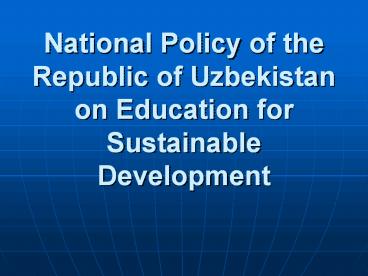National%20Policy%20of%20the%20Republic%20of%20Uzbekistan%20on%20Education%20for%20Sustainable%20Development - PowerPoint PPT Presentation
Title:
National%20Policy%20of%20the%20Republic%20of%20Uzbekistan%20on%20Education%20for%20Sustainable%20Development
Description:
National Policy of the Republic of Uzbekistan on Education for Sustainable Development – PowerPoint PPT presentation
Number of Views:230
Avg rating:3.0/5.0
Title: National%20Policy%20of%20the%20Republic%20of%20Uzbekistan%20on%20Education%20for%20Sustainable%20Development
1
National Policy of the Republic of Uzbekistan on
Education for Sustainable Development
2
Uzbekistan key figures
- Population 26 mln people.
- The density of population in Andijan region
about 400 people in 1 sq km. - In Navoi region about 17 people.
- About 60 of population is living in rural
areas. - More than half of the total population is under
25 years old. - More than 130 ethnic groups.
- Two ministries of education in Uzbekistan the
Ministry of of Higher and Secondary Specialized
education and the Mnistry of Public Education. - Education system is mainly financed and
administrated by the State. - More than 10,000 general secondary schools,63
high educational and 539 technical and vocational
institutions. - Almost 99 of the population is literate..
- The textbooks are published in 7 languages.
- 7,8 of GDP (2005) is provided for the needs of
educational system
3
(No Transcript)
4
(No Transcript)
5
Sustainable development issues in Uzbekistan
- Many of SD issues are inherited from the Soviet
period. - Absolute or partial loss of natural resources
- Decreased productivity of landscapes
- Exhaustion of water system and soils
- Aral sea disaster
- Desertification
- Salinization
- Intercultural dialogue
6
Adopted documents in SD in Uzbekistan
- Activities for Realization of the Program of
Actions in Environment Conservation (2006-2010) - Program of Environmental Monitoring (2003-2005)
- State Program on Provision of Rural Population
with drinking Water and Natural gas for the
period 2000-2010 - National Environmental Action Plan (1999-2005)
- State Program for Environmental Protection and
the Ra6tional Use of Natural Resources
(1999-2005) - Presidents Decree On priority Areas to
Strengthen Agriculture Reforms (2003) - National Action Program to Combat Desertification
(1999) - National Strategy and Action for Biodiversity
Conservation (1998) - National Action Plan on Environmental Hygiene
(1995) - National Environmental Health Action Plan (2004)
- National Waste Management and Action Plan (under
formulated) - Strategic Program on Counteracting the HIV/AIDS
Epidemic during 2003-2006 (2003). - New Strategic Program on Counteracting the
HIV/AIDS (2006).
7
Implementation of ESD in Uzbekistan
- ESD is consedered as one of the key prioryty
- Development of Environmental Education and
Perspectives of Improvement of Preparing and
Retraining of Personnel in Environmental
protection in Uzbekistan for 2006-2010 adopted
earlier this year.National Policy on ESD is
starting to be implemented from 2006 - Coordination Council for Environmental Education
and Education for Sustainable Development is
being created
8
Some recent events in the field of ESD
- May 11, 2006. UNESCO Office in Tashkent, the
National Commission of the Republic of Uzbekistan
for UNESCO and National University of Uzbekistan
had organized the National launch of DESD - 15 June 2006 National seminar on Improvement of
Environmental Education, - August 17-27, 2006 UNESCO Youth Camp Youth and
Sustainable Development Environment for Healthy
Life for 180 young leaders.
9
UNESCO Youth Camp Youth and Sustainable
Development Environment for Healthy Life
10
(No Transcript)
11
(No Transcript)
12
Perspectives of ESD in Uzbekistan
- The main objectives in future
- To improve the quality of Basic Education
- To develop values education
- To incorporate SD issues into formal and
nonformal education systems - To increase the role of ICT in Education (to
supply secondary schools with computers increase
computer literacy) - To develop electronic textbooks and multimedia
trainings aids.

